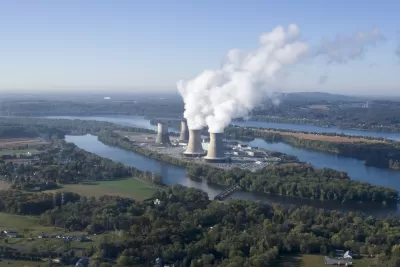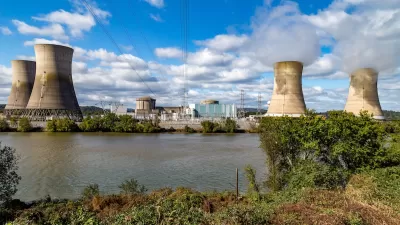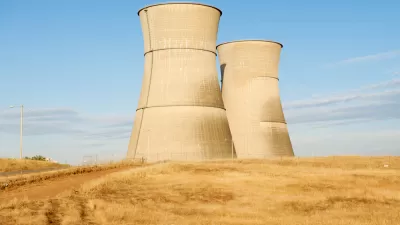Nuclear power plants around the country are shutting down. The communities where nuclear plants have been located for decades will now have to figure out how to rebuild their economies without them.

"There’s at least one thing worse than having a nuclear power plant in your town," writes Alan Greenblatt. "That’s having your nuclear power plant shut down."
Greenblatt sums up the issues that arise after a nuclear plant closes:
For obvious reasons, nuclear power plants were mostly built in fairly remote places, away from population centers. But they’re big facilities, with highly paid staff. When one of them closes, it can leave enormous holes in the local tax base.
The occasion for Greenblatt's analysis is the recent announcement by Exelon Corp that it will close down Three Mile Island in 2019. Three Mile Island is the site of the worst nuclear disaster in U.S. history, so Greenblatt's lede is all the more pointed.
Greenblatt says previous plant closures have preceded population losses and increased taxes. When the Vermont Yankee plant in Vernon, Vermont shut down in 2014, the local economy lost $100 million of activity. Another case study is offered by San Luis Obispo, in California, where the Diablo Canyon reactor is shutting down. Greenblatt suggests such towns will be challenged by implementing a new lens for their long-term strategic planning: one without the built in economic engine of a nuclear power plant.
FULL STORY: This Is What Happens When a Nuclear Plant Shuts Down

Planetizen Federal Action Tracker
A weekly monitor of how Trump’s orders and actions are impacting planners and planning in America.

Map: Where Senate Republicans Want to Sell Your Public Lands
For public land advocates, the Senate Republicans’ proposal to sell millions of acres of public land in the West is “the biggest fight of their careers.”

Restaurant Patios Were a Pandemic Win — Why Were They so Hard to Keep?
Social distancing requirements and changes in travel patterns prompted cities to pilot new uses for street and sidewalk space. Then it got complicated.

California Homeless Arrests, Citations Spike After Ruling
An investigation reveals that anti-homeless actions increased up to 500% after Grants Pass v. Johnson — even in cities claiming no policy change.

Albuquerque Route 66 Motels Become Affordable Housing
A $4 million city fund is incentivizing developers to breathe new life into derelict midcentury motels.

DC Area County Eliminates Bus Fares
Montgomery County joins a growing trend of making transit free.
Urban Design for Planners 1: Software Tools
This six-course series explores essential urban design concepts using open source software and equips planners with the tools they need to participate fully in the urban design process.
Planning for Universal Design
Learn the tools for implementing Universal Design in planning regulations.
Heyer Gruel & Associates PA
JM Goldson LLC
Custer County Colorado
City of Camden Redevelopment Agency
City of Astoria
Transportation Research & Education Center (TREC) at Portland State University
Camden Redevelopment Agency
City of Claremont
Municipality of Princeton (NJ)





























